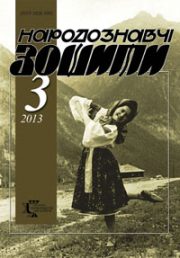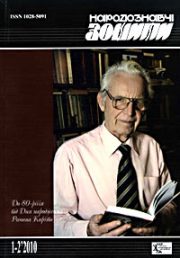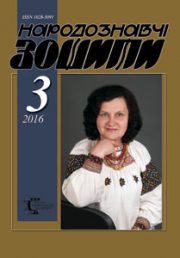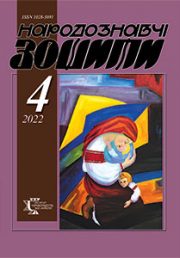The Ethnology Notebooks. 2023. № 4 (172), 995—1002
UDK 398.3(=161.2:477.86):[630*28:635.8]
DOI https://doi.org/10.15407/nz2023.04.995
TSURKAN Mariana
- ORCID ID: https://orcid.org/0009-0009-4267-5157
- Candidate of Historical Sciences (Ph.D. in History),
- Junior Researcher at the Ethnology Institute
- of National Academy of Sciences of Ukraine,
- 15, Svobody Avenue, 79000, Lviv, Ukraine,
- Contacts: e-mail: mariana_tsyrkan@gmail.com
Abstract. The purpose of the article is to highlight the traditions of mushroom picking in Pokuttya. In the article, the main goal and factors of mushroom picking and their place in traditional food of the Pokuttya residents are clarified. Meals with mushrooms take a prominent place in traditional food. The local names and hierarchy of mushrooms picked by the residents are distinguished. It is considered the division of mushrooms into separate groups: spring (pidsadky), summer (champignons and glyvy), autumn (pidpenky, borovyky) and healing (veselka and porkhavka). The behaviour of mushroom pickers in the forest and restrictions associated with mushroom picking in Pokuttya are investigated in the article. The process of picking mushrooms covers a variety of traditions, beliefs, and signs. This process is changed, improved, and filled with modern elements. In Pokuttya, you can’t pick mushrooms with roots and destroy the mycelium.
The main ways of processing and storing mushrooms for the winter period are described. The traditional method of storing mushrooms was drying and salting. The traditional and innovative ways as well as the chronological limits of the appearance of new ways of storing mushrooms in Pokuttya are determined.
The object of the research is the mushrooms as the product of harvesting as well as the natural, climatic and geographical phenomena that affected the functioning of this additional occupation in Pokuttya. The subject of scientific article is to investigate the elements of the archaic worldview elements and folk knowledge about mushroom picking in Pokuttya and their observance nowadays.
The author’s field ethnographic research materials in the villages of Horodenka district, Ivano-Frankivsk region in 2016 as well as the scientific research of the nineteenth — twenty first centuries are the source base of this article. The chronological framework of the article covers the late nineteenth — early twenty firstcenturies.
The research methodology is based on theoretical and historical analysis, the principle of scientific objectivity, systematization and the author’s observations.
Keywords: Pokuttya, ethnography, additional occupation, mushroom picking, mushrooms, «vorochok», «mishchur».
Received 29.06.2023
REFERENCES
- Dmytrenko, A., & Hrymych, Maryna (Ed.). (2012). Women’s labor specializations: pocking (collecting). Folk culture of Ukraine: the life cycle of the person. Historical and ethnological research: in the 5th vol. Maturity. Womenfolk. Women’s subculture (Vol. 3, pp. 20—51). Kyiv: Duliby [in Ukrainian].
- Kyrchiv, R. (2017). Pokyttia as a historic — ethnographic district of Ukraine. Ethnology notebooks, 1 (133), 3—20 [in Ukrainian].
- Kolberg, O. (1882). Рокусе. Ethnographic image (Vol. 1). Krakow: Jagiellonian University Printing House.
- Mrochko, Fr.K. (1897). Sniatynshchyna. Reasons for regional ethnography (Vol. 1). Lviv: Printing house of the Wladyslaw Lozynsky [is Polish].
- Bazhansky, M. (1982). The beauty of the Sniatyn Region: rivers, steams, forests, meadows, gardens, cities, villages and the material and spiritual culture of their inhabitants: Encyclopedia. Detroit [in Ukrainian].
- Sapeliak, O. (2017). Pokutian’ nutrition. Ethnology notebooks, 1 (133), 136—153 [in Ukrainian].
- Taras, Ya. (2023) Food in a family household and calendar rituals on Pokuttia. Ethnology notebooks, 1, 44—57 [in Ukrainian].







